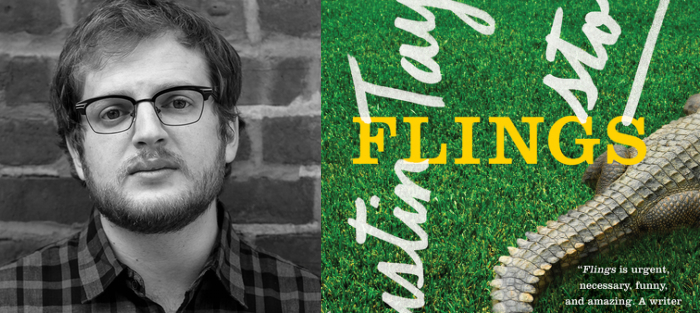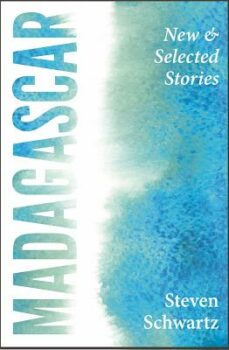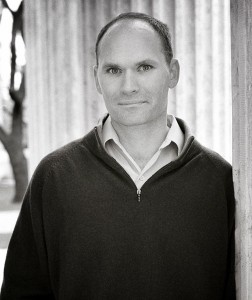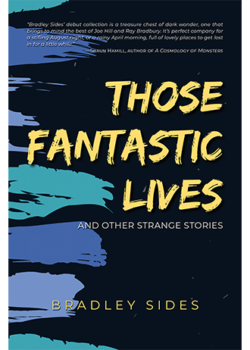Wyoming’s high desert is an unsettling eight hours of the 27-hour drive (at a moving truck’s pace) from Lincoln, Nebraska to Portland, Oregon. And for this stretch, Wyoming seems really into the idea of you dying in it: everything is scorched brush, too many highway memorials, and hundreds of miles of near-shredded interstate concrete, explained by signs that shruggingly read: ‘Road Damage.’ It was this leg of the drive, with everything I owned rumbling behind me, that most made me wonder why I was doing it, or if my best life wasn’t happening back the other direction.
In step with it or amplified by it, this was also the portion of the drive where I re-read Justin Taylor’s vivid and stunningly natural 2014 story collection, Flings. It’s newly out in paperback from Harper Perennial, and I was going to meet up with Taylor a couple days after arriving in Portland, where the formerly Brooklyn-based writer has lived since May.
There’s nothing desolate or fatalistic about the twelve stories in Flings. But they do house characters who’ve just made life-altering decisions, or stepped to the very ledge of doing so. In Flings, those people are New York socialites, retired and lonely teachers, wayward dads trying their best maybe too late, and “pizza pub” burnouts. Taylor’s writing, especially with how pliably it modulates time, hints that they’re all, and always have been, adrift. We’re just stepping in for moments of mindfulness. Flings, his debut novel, The Gospel of Anarchy (Harper Perennial, 2011), and his debut collection, Everything Here Is The Best Thing Ever (Harper Perennial, 2010), are all, in their own ways, appeals to human observation, especially the all-important undesirable stuff. Protagonists and side characters are likely to remind you of you, people you know, and people you think you know. And, yet, the reader’s presence in the stories is casual, sutured so easily by Taylor lifeguarding would-be cannonballs of time-lapse and point-of-view shift into tranquil plunges.
I’d met Justin Taylor one other time, at a 2012 function at the Housing Works bookstore cafe in Manhattan. He was very kind and generous with his time then. And the same was true again during the following conversation, which occurred over coffee in Taylor’s southeast Portland apartment. It came after a stroll and some food-truck falafel, and was intermittently eavesdropped upon, then ignored, by Taylor’s recently adopted cat, Emma.
Interview:
Chance Solem-Pfeifer: You living in New York for a decade, that’s pretty much the epicenter of all things publishing. Is there a literary community that exists in Portland? And whether yes or no, is that something that’s important to you?
Justin Taylor: There is a literary community here, absolutely, and it’s been particularly welcoming. Which has made the transition much easier and more positive experience than it might have been otherwise. There’s a lot of great stuff happening here. First and foremost, Tin House Magazine and Books are both based here. The actual tin house itself is up on NW 26th.
I didn’t know there was an actual house.
Yeah! The magazine is named for it. You can actually go see it. They’ve been quite supportive of Amanda and her job, and of both of us coming out here. [Taylor’s wife, Amanda Bullock, is the Festival & Events Manager for the Wordstock book festival.] And a lot of writers are here. Arthur Bradford, Jon Raymond, Sara Jaffe, Kevin Sampsell, Zachary Schomburg, Patrick deWitt, Emily Kendal Frey, Karen Russell…
Your writing is so rich in place. When you up and come to a new locale, what are the first few weeks like for you, as a person who’s probably super observant of setting and habits and culture? Is it a hyperactive time?
In a new place you definitely notice every little thing. One of the first things I noticed here, which for the first couple months I found quite frustrating, and now am willing to be more charmed by, is that people are super friendly. They want to talk to you, like have an actual conversation, even if you’re just buying coffee or checking out at a grocery store. There’s no sense of urgency to these transactions. People are always asking, “What are you doing later?” And they really mean it, by way of totally earnest civil inquiry. In New York, that would be so unheard of, like if you’re buying something at Rite Aid …
“Why do you want to know!?”
Yeah! At first I was just totally confused by it, and a few times I thought I was being hit on, but eventually it attuned me to the ways that my own default state was maybe more keyed up than it needed to be.
I think you’re describing stuff that anyone in a new place could notice. Are you active about those observations because of what it could mean for writing, or worldview that could pour itself into future writing?
I do not think about it actively. I’m just a person going about my day. But I think all writers have that weird thing of watching themselves take an action. Anything you do in a day could end up in the work. There’s always that sense that your shadow is following around behind you taking notes.
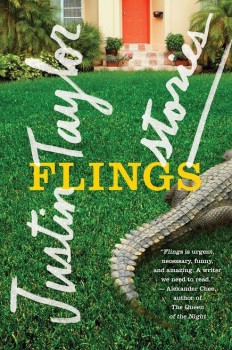 I read the Lithub piece that you wrote about book tours last summer. You talked about how on the tours for the last two books, you drafted several of the stories from Flings. What is it about that environment or schedule that lends itself to working for you?
I read the Lithub piece that you wrote about book tours last summer. You talked about how on the tours for the last two books, you drafted several of the stories from Flings. What is it about that environment or schedule that lends itself to working for you?
Just having chunks of unscheduled, unaccounted-for time. One of the things I really like about being on planes, as uncomfortable and expensive as they are, is the feeling of disconnection. Say the flight is four or five hours, now tack on packing, the airport, a couple cab rides and the rest of the day being shot—that’s a good 24 hours of being basically out of touch and alone with your thoughts. It’s a good time to think the idiot thought. In the course of a regular day when you only have two hours to write, you’re not going to say, “Well, I’ll fuck off and do this weird thing.” No, you’re going to spend your time wisely. Left alone by yourself long enough, you’ll try out the bad idea.
Is there the skeleton or the residue of what you’d called “the idiot idea” in any of the Flings stories? Anything where you worked your way through something big you otherwise wouldn’t have had time to?
The story called “Mike’s Song”— that came from as silly an idea as I could have. At least it felt that way to me. There was a story in my first book called “A New Life,” and I had an idea for sequel to it. Which is not unheard of, so that’s not the silly part. But because of how “The New Life” ended, with the death of its narrator, there was really no way back in. So if it was going to be sequel, it had to be anchored in one of the other characters—or told by a ghost. I spent years screwing around with it from the other kids’ points of view, and god help me even the ghost thing. None of it really worked because it was all pointing backward at the original story. I finally came up with the idea of the narrator’s friends’ father as the point-of-view character, because he’s not mentioned once in the original story. But because he’d been so removed from the original events, they meant nothing to him, which seemed like a problem but turned out to be very freeing in terms of the writing—though it made no sense in terms of what my idea for a sequel should be. So this is where you start to make yourself nuts. Eventually, I realized that the fact that he barely knew the dead kid was the great advantage of the new story. It pushed all the old plot stuff to the very fringes. You don’t need the original story to read the new one at all.
And, in “Mike’s Song,” when they drive by the [deceased] kid’s house on the way to the concert, that story exists on the literal periphery of this new story.
Right, exactly. And that’s probably the best example I can give you, though there’s also “A Night Out.” It was originally called “Everything Here is the Best Thing Ever.” It was supposed to be the title story of my first book. And everyone hated it.
Why?
In its original version, it was two or three thousand words. Very short. Very Carver-y, Lish-y. Minimalist, and these two dudes go out and get fucked up. Whatever. My first agent hated it, my second agent hated it. The first thing my first editor did when he bought Everything Here was take it out. And for good reasons, I eventually came to feel.
But I just couldn’t let it go. The story always had this weird chronological loop-de-loop in the middle, where stuff is happening and then it jumps back and retells a part of itself and then jumps forward again. And I felt strongly that the solution to the story’s problem was not with its content, as everyone said, but structural. It either needs to have its central knot untied or else it needs to be all tied up in knots—it needs, in effect, to become a story about knots.
For the next few years, say from 2008 on, every time I had a stray piece of prose—an unfinished sketch, a little fragment of description, a darling killed and culled from some other story—I would find a place for it in “A Night Out.” Or I’d add another point-of-view character, find some other way to further knot it up. The final twist of the narrative knife was changing it into the second-person point of view. Making it a “you,” but a “you” that functioned as though it were a “he.”
But a half-decade Frankenstein story? That’s crazy.
What it didn’t have before was gravity. It was not able to justify its own existence. And what it finally became, what it is, may be an abomination. It may be a Frankenstein, as you say. But if it is, it’s at least an eight-foot-tall Frankenstein terrorizing a town. It’s not a baby Frankenstein in a mouse cage.
And I wanted to ask about the second-person. It’s really odd that what you end up with in that story is this ensemble cast that basically does have equal billing. But one of them is “you” for some reason. You assume “you” will be the star of story. And that’s really not true. What effect do you think that produces? Because I remember the first thing that grabbed me about Everything Here is the first story, “Amber at the Window in Hurricane Season,” which does the same thing. That one is snapshot-ier, more of an experiment in form, weaving in the “I” talking to a “you” about “Amber.” But it grabs you by the collar.
 The second-person is interesting, because not only is it hard to do, but even when it’s done well it’s hard to justify having done. Even the best version of the second-person—which is what, Bright Lights, Big City? Or the Jamaica Kincaid story “Girl”? Those are probably two examples where the second-person is actually earned. I can think of a few others, but not many. That early story of mine, “Amber at the Window,” was probably as close to a prose poem as I could do and I wanted it to feel like the overture to the book. That was my reasoning there.
The second-person is interesting, because not only is it hard to do, but even when it’s done well it’s hard to justify having done. Even the best version of the second-person—which is what, Bright Lights, Big City? Or the Jamaica Kincaid story “Girl”? Those are probably two examples where the second-person is actually earned. I can think of a few others, but not many. That early story of mine, “Amber at the Window,” was probably as close to a prose poem as I could do and I wanted it to feel like the overture to the book. That was my reasoning there.
But I wanted “A Night Out” to be disorienting, and I wanted it to invite the charge that it was ripping off Bright Lights, Big City, which is what I kept hearing when it was getting rejected over and over for years on end. “This is McInerney-lite.” I don’t know if that’s true, because I’ve never read Bright Lights, Big City, and I suspect some of the people saying that had never read it either, but I thought, “If that’s what they’re saying, I’ll give it right back to them, and put that right at the front.” I wanted to invite a degree of readerly derision or confusion that would ultimately deflate by the end of the story.
Right. “You” are just the dude who’s asleep on the couch as Candi [with whom the story ends] leaves the apartment.
Yeah, and by the end, it’s much more interested in her. I like it when a book or a story will sort of evolve its sense of who is important as it goes. “A Night Out” loses interest in its main character; as if the prose were responding to his behavior the way you might get annoyed with a too-drunk friend. By the end, it all but tells him to go fuck himself.
Ducking back, it was weird to me because I didn’t think of it the first time I read “Mike’s Song,” but I did coming out here…the only other time we’ve met in person was at Housing Works in Manhattan [in 2012].
And we were talking about going to a Phish show.
Yes! Was it Atlantic City?
I think so. Halloween in Atlantic City, and I was trying to get people to go.
And that made me wonder if that 2012 Phish show was your first. Because the story is really in the perspective of someone who’s at this really defined subcultural thing [a Phish concert], and he’s a total outsider. He’s sitting down when everyone is standing. He’s thinking of these songs, that everyone knows really well, as these visual…well, he’s seeing guitar lines in the air. But then I read in the Flings author’s note that you went to the one in the story in Florida from 2009. How many have you been to in your life?
Well, not as many as some people.
That’s probably for the best, right?
I saw them for the first time when I was senior in high school. They did their millennium show in ’99-’00, a three-day camp out at Big Cypress National Park and I went down with a bunch of friends. I never had the energy or the proximity to be part of the jam band scene. There were a few hippies in my high school and we traded [Grateful] Dead tapes, but I think the scene part of it was very much a Northeast, and maybe now Western, phenomenon. You would’ve had to drive 12 hours from where I grew up to join up with the tour. The summer after I graduated high school, I did drive up with a couple guys to see them in Nashville and then two nights in Atlanta. I wanted to drive on to North Carolina but we went back instead, because we had to start college. I was early admission, pre-freshman summer student at UF. So how many shows am I up to? Four? It’s going to come to, like, sever or eight total. I’m not a hardcore head, but I’ve been listening to them since high school. Let’s say seventeen years now. It’s about the most fun you can have at a concert, I think. You wanna talk about a welcoming scene? Every class, stripe, attitude. I’d recommend it to anybody. As long as you can stand the music, you should definitely go.
In writing “Mike’s Song,” was that a difficult or interesting maneuver? You’re writing about this very in-thing from the perspective of a dad who’s here to spend time with his kids, but doesn’t really know what it’s about.
It wasn’t. And I don’t know what this says about me, but I find it’s a very natural gesture to take something you know well and like a lot and describe it as though you were completely alienated from it. So much of writing is information management. Especially with things like music or pop culture, it’s so easy to fall into the trap of sycophancy or fandom. And not that one should never wear one’s heart on one’s sleeve, but if you love something, sometimes that’s all you can say about it.
Whereas if you’re writing about that same thing from the point of view of someone who disdains it or simply doesn’t understand it, that opens the door to a lot possibilities. It lets you poke fun at yourself or dissect the thing in a way you wouldn’t when you’re just engaging with it for pure enjoyment. I write this way a lot actually.
Like with what else?
Well, especially with music. If something comes in for a beating in one of my stories, odds are, I like it.
You ever write to jam band music? Does it lend itself well?
I don’t write to any music. I love music, and I love thinking about it. But I write by ear. I write to sound. And when I’m revising, especially, I read out loud to myself a lot. So there’s never music on.
Because of that style of wanting to read aloud or hearing the text that way, when it comes to reading publicly, is that fun, or at least natural, to you?
I’ve always been comfortable with public speaking. I did speech and debate in high school. I was also a child actor, a ham in every home movie. I feel comfortable at the front of a room, and I know how I want things to sound. I’m also quite loud when I choose to be, so I don’t have that fear of not being heard. Those are big advantages, and I know not all writers have them, when it comes to the public side of this mostly private art.
I was listening to the reading embedded on The New Yorker’s online edition of “So You’re Just What, Gone?” And the way you inflect Charity’s voice in the story seems really connected to or inextricable from how the reader would read it.
That’s the goal. Without resorting to italics or all-caps or other textual-visual cues, you want the prose to be at a point where it demands to be read the way you want it. I mean tonally, of course. Thematically, or whatever, it’s always open season.
I’ve done two of those New Yorker recordings now. They have a specific idea of what they need in terms of pacing and volume. There’s a house style both on and off the page, which I suspect is true of audio in general. I did the audio book for Flings. Spent three days with an audio engineer, in a studio in Midtown. That was even more exacting—how much intonation is too much, that the spoken text match exactly what is printed, down to contractions and commas. If there’s a comma there, you pause for a comma-length pause. Not a semi-colon length pause and you certainly don’t read through it.
They were gonna hire an off-Broadway actor to read Flings, and when I heard that, I made them give me an audition. “Wait, if someone is going to get paid to do the audiobook for Flings, it’s gonna be me!”
[Laughter.] Did you beat out an actor to read your own collection?
Once they let me audition, I don’t know if they actually auditioned other people. But they would have otherwise, so I either beat out some poor guy or else I kept him from even getting to try out in the first place.
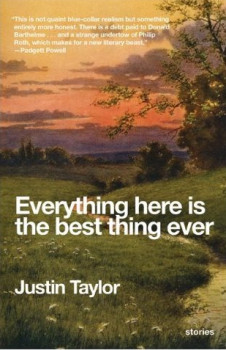 That makes me think of a character-based question and a recent interview you did for Writer’s Bone. You were asked by Sean Tuohy whether you outlined your stories, and you said somewhat energetically that you don’t care what happens to these characters. You don’t want to be their puppet master. But one of the things I think you said afterward is that sometimes whole characters can be born backward out of things people say. You might ask, “What kind of person would say that?” And I think that relates to what we were just talking about, because that takes a very auditory sensibility. Are there any examples of that you can think of? A sentence or a line or an attitude?
That makes me think of a character-based question and a recent interview you did for Writer’s Bone. You were asked by Sean Tuohy whether you outlined your stories, and you said somewhat energetically that you don’t care what happens to these characters. You don’t want to be their puppet master. But one of the things I think you said afterward is that sometimes whole characters can be born backward out of things people say. You might ask, “What kind of person would say that?” And I think that relates to what we were just talking about, because that takes a very auditory sensibility. Are there any examples of that you can think of? A sentence or a line or an attitude?
That’s a good question. I don’t know if I can give a good example offhand. I find more often someone is doing something. If it’s first-person, the voice develops along with the character. A big part of what they do, or what happens, has to do with how the voice develops. It governs how they see the world. But if anything is close, it’s that story “Sungold.” That one sprung out fully-formed; no gestation. I knocked the first draft out in a day and a half. And that is a language-driven story [strongly emphasizing ‘m’ sounds and accented syllables]: “Twenty minutes max in the mushroom suit.” And let me just quickly add that attention to aesthetics isn’t separate from attention to character—it’s part of it. This narrator’s syntax, and more than that the rhythms of his sentences, are what allow him to observe the world the way he does, and make the jokes he makes, that make him the embittered fuck that he is. If you write his voice differently, it’s immediately a different story about a different person.
In the title story, and in “Poets,” time jumps forward. As a reader, they really sneak up on you. Which I suppose is good. I wonder when you were making that decision if it was a sticky one. Seems like a precarious moment.
Well, I guess some people went along with them and some people didn’t. When I think about those stories, and you’re quite right to pair them together, the modulation of time was a key question for me in writing them. I wanted to see how much scope each story could contain. In “Flings,”that’s expressed in terms of character, as well as time—but both stories ask you to consider the possibility of a narrative defined by duration. In “Poets,” especially, the story insists it’s a story because it’s all happening to the same person. There’s no plot as such. It moves by a kind of necessity. And I got that from Barry Hannah. The later stories, the stuff in Bats Out of Hell and High Lonesome. They almost all have that structure, and they’re longer, too: eight, nine, ten thousand words. I was thinking a lot about that and what it would look like, which is to say how I could pull it off or rip it off, in my own work. Mary Gaitskill’s story “Heaven” has a similar structure, or ethos to it. Saul Bellow’s “The Old System.” Certain Alice Munro stories. But what kept me coming back to the Hannah was the insistence on pure momentum–he doesn’t put in any space breaks, because he doesn’t want the reader to stop, and he doesn’t want the reader to stop because the character wouldn’t. So once again structure, aesthetic choice, becomes a mode of character development, and the fairly unobtrusive vehicle for expressing a fairly radical idea about narrative and time. Neither “Poets” nor “Flings” has a space break in it. Come to think of it, neither do “Mike’s Song” and “Gregory’s Year.”
My closer might have to be something silly. You tweeted about reading about pinball the other day. What’s going on there?
Portland is a great pinball town. New York has some great pinball enclaves, but they are few and far between. But here the bars are larger, and real estate is cheaper, so you can put four or five machines side by side. Beulahland has one of my all-time favorite tables. It’s called like Invaders From Mars or Attack from Mars. It’s not a tie-in to the Mars Attacks! movie, it’s older than that, I think.
Do you prefer non-branded?
I don’t care. And, these days, I don’t know that non-branded machines exist, because there’s only one or two companies still making them. Pretty much now, pinball machines get made as tie-ins to other franchises or they don’t get made. I like the Dark Knight-era Batman table and I didn’t like those movies at all. The Spider-Man one (from one, two reboots ago?) is also a lot of fun and I’ve never seen any of those movies. What I like about pinball is the physicality of it, all the moving parts, the ball rolling up and down this plank of wood. But the reason I’ve been looking at the Wikipedia page is a scene I’ve been working on. And I don’t know if it’ll survive or not, so no one may ever read it. But a character is playing a pinball machine, and the machine is a tie-in to a TV series I made up—that this other guy was on. She knows this guy and happens to have come upon this pinball machine with her friend’s face on it. It’s basically a four-page scene that describes, shot by shot, a particularly good ball she plays. In order to do this, I had to learn the technical terms. I know the flippers and I know about bumpers, but I learned about pop bumpers and drop targets. Because in the first draft, it was like, “And then she hit the thing that’s over here!” But now I have pretty good idea of it.
Well, I’m glad it was for a scene and it wasn’t about nothing.
It may come to nothing, but it’s not nothing yet.

